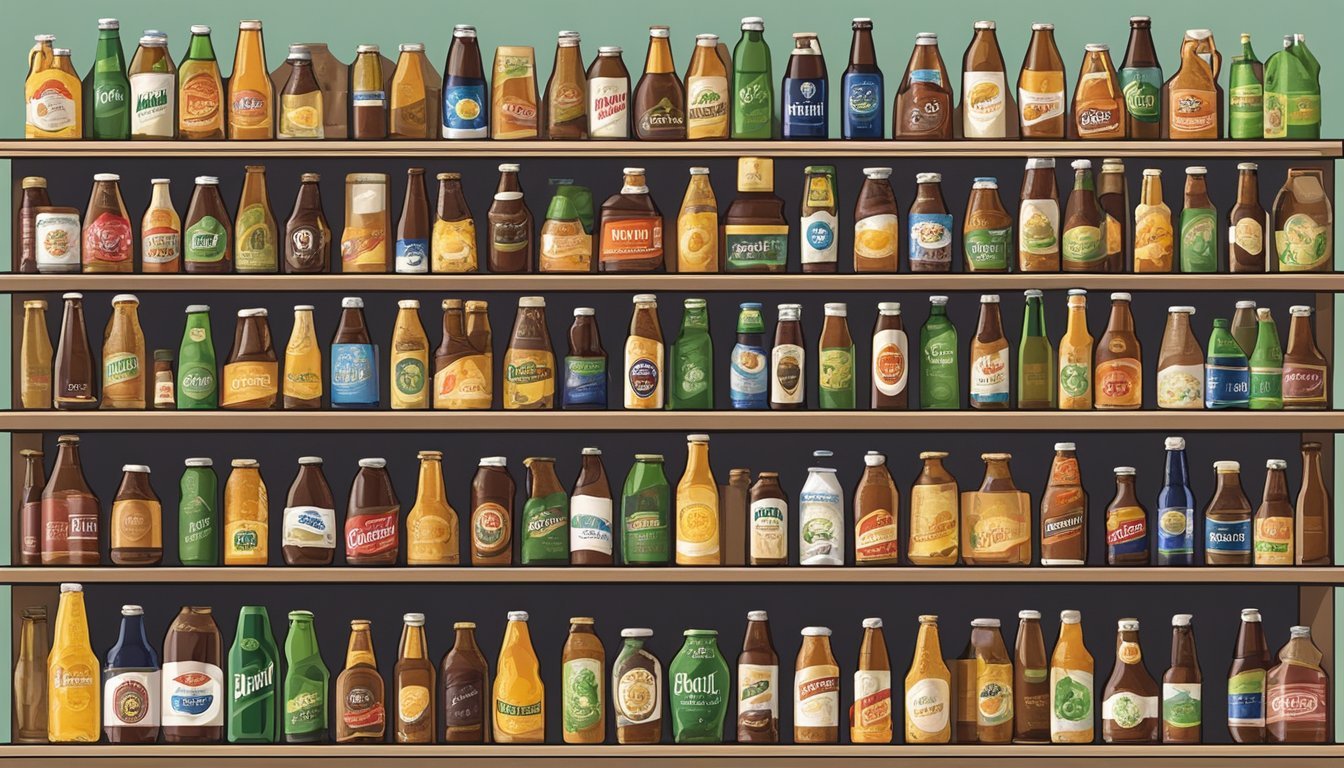Beer Substitutes
Top Non-Alcoholic Alternatives for Beer Lovers
Cooking with beer can infuse a recipe with complex flavors ranging from the subtle bitterness of hops to the rich depth brought by a dark ale. However, not every situation allows for the use of this alcoholic beverage, prompting the need for beer substitutes. Whether due to health considerations, dietary restrictions, or simply the absence of beer in the pantry, finding an alternative that provides a similar flavor profile without compromising the intended outcome of a dish is essential. Substitutes for beer in cooking take into account factors like the recipe's required taste, texture, and liquid content.
Amongst suitable substitutes, non-alcoholic beer stands out as a direct replacement, preserving the beer's flavor without the alcohol content, making it an excellent choice for those avoiding alcohol. In the realm of health and nutrition, alternatives such as broths, herbal infusions, and various juices address concerns from gluten-free to vegan diets without sacrificing the culinary intention behind the dish. Various carbonated beverages, including ginger ale or cola, can be employed for their fizz and sweetness in batters, while stocks, fruit juices, and even vinegar may bring the desired acidity or depth to stews and marinades.
Understanding these substitutes is crucial not only for those with specific health and dietary needs but also for home cooks looking to experiment with new ingredients or adapt a recipe to their personal preferences. Each substitute offers a unique dimension to cooking, ensuring that the dish retains its intended character, even when the beer is left uncapped.
Beer Substitutes Overview
In the culinary world, the inclusion of beer in recipes imparts distinct flavors and properties. However, finding a suitable substitute for beer can be crucial for various reasons, ranging from dietary restrictions to alcohol content concerns.
Defining Beer Alternatives
When a recipe calls for beer, one may consider using a beer substitute to achieve similar flavor profiles or cooking effects without using this alcoholic beverage. Beer alternatives often mimic the unique characteristics of beer, such as bitterness, sweetness, and the ability to tenderize meats during the cooking process. Non-Alcoholic Beers can serve as direct substitutes, maintaining the beer flavor without the alcohol. Other alternatives include:
For Light Beer:
Chicken broth
White grape juice
Ginger ale
White wine
For Dark Beer:
Mushroom stock
Apple cider
Root beer
Reasons for Substituting Beer
Individuals may seek a beer substitute for various health or personal reasons. Some may wish to reduce their alcohol intake while others might have dietary restrictions, such as a gluten-free or vegan diet. Beer contains gluten, which is problematic for those with celiac disease or gluten sensitivity, necessitating a gluten-free alternative. Vegans may also opt for beer substitutes since some beers are processed with animal products. The use of beer alternatives allows everyone to enjoy a similar taste experience, regardless of their dietary needs or health objectives.
Non-Alcoholic Substitutes
When cooking, one may often look for non-alcoholic alternatives to beer that maintain the integrity of the dish's flavor profile. The following subsections explore various substitutes, each contributing its unique traits to a recipe.
Carbonated Alternatives
Carbonated beverages add the desired fizziness in dishes that traditionally use beer for its effervescence. Non-alcoholic beer is the most direct substitute, offering similar flavors without the alcohol. Soda water is a neutral option, while flavored sodas such as ginger ale or root beer can add distinctive tastes depending on the desired outcome.
Non-Alcoholic Beer: Mirrors beer's flavor profile
Soda Water: Provides carbonation without flavor
Ginger Ale: Adds a spicy kick
Root Beer: Offers a sweet and complex flavor
Stock and Broth Options
Broths and stocks are excellent for adding depth of flavor to stews and braises. Chicken broth or beef broth can be used for lighter or darker beer nuances, respectively. Vegetarian options include mushroom stock or a concoction of water mixed with a small amount of Marmite or Vegemite for umami richness.
Chicken Broth: Suitable for recipes needing a light beer taste
Beef Broth: Best for dark beer substitution
Mushroom Stock: A robust vegetarian alternative
Water Mixed with Marmite/Vegemite: Enhances savory notes
Juice-Based Options
Fruit juices introduce natural sweetness and acidity, making them suitable for marinades or glazes. Apple juice can replicate the sweetness of certain ales, while tomato juice may serve well in more savory dishes. White grape juice is another contender, providing a subtle, fruity sweetness to dishes.
Apple Juice: Sweetness similar to some mild beers
Tomato Juice: Savory tang for heartier recipes
White Grape Juice: Gentle sweetness for light dishes
Tea and Coffee Variations
Tea or brewed coffee can replace stouts or porters, especially in recipes that benefit from their bitter and robust notes. It is important to choose a tea or coffee strength that balances well with the other ingredients in the recipe.
Brewed Coffee: For stout-like bitterness
Tea: Offers a variety of flavor profiles depending on the type
Composite Mixes
Mixes are combinations of various liquids that together mimic the complex flavors of beer. A blend of soy sauce and apple juice may offer both sweetness and saltiness needed for certain sauces, while Worcestershire sauce mixed with a bit of fruit juice can deliver a balance of sweetness, tartness, and depth. Composite mixes should be tailored to the specific taste one hopes to achieve.
Soy Sauce and Apple Juice: A sweet and savory blend
Worcestershire Sauce and Fruit Juice: Complex, layered flavors
Alcoholic Substitutes
When cooking, one may require an alcoholic substitute for beer to maintain the integrity of flavors intended by the original recipe. Distinct types of wines, spirits, and other liquors offer a range of tastes that can mimic or enhance the profile of different beers.
Wines and Spirits
For dishes that originally call for light beers, white wine can provide a similar crispness and subtle fruitiness. An unoaked Chardonnay or Sauvignon Blanc are excellent choices—their bright acidity can be particularly beneficial in seafood dishes or chicken recipes. Conversely, red wine works best as an alternative to darker beers due to its robust flavor, which complements red meats and hearty stews. Sherry, with its nutty notes, can also step in for amber ales in marinades and sauces.
White Wine (for light beer):
Chardonnay
Sauvignon Blanc
Red Wine (for dark beer):
Merlot
Cabernet Sauvignon
Sherry (for amber ales):
Dry Sherry
Specialty Beers
Specialty beers, including non-alcoholic versions, can be effective substitutes when one wishes to retain beer-like flavors without the alcohol content. They undergo fermentation akin to regular beer, ensuring that the taste remains as close to the traditional profile as possible. Kombucha, a fermented tea, may also serve as a unique substitute for sour or fruit beers due to its tanginess and effervescence.
Non-Alcoholic Beer
Kombucha (for sour/fruit beer)
Other Liquors
In recipes where a strong, complex flavor is desired, spirits such as whiskey or sake can replace dark or heavy beers. Whiskey adds a smoky, caramel tone to dishes, ideal for meats and winter recipes. Sake, a Japanese rice wine, brings subtle sweetness and umami, particularly complementing Asian cuisine. For a more neutral alcohol flavor, vodka can be a versatile substitute, and tequila provides an earthy depth suitable for Mexican dishes.
Whiskey (for smoky, deep flavor):
Bourbon
Scotch
Sake (for Asian dishes):
Junmai
Ginjo
Vodka (for neutral flavor)
Tequila (for earthy depth)
Culinary Considerations
When choosing a beer substitute in cooking, it's essential to consider how it will affect the taste, texture, and the ways it pairs with various foods. The right substitute not only provides a similar flavor profile but also interacts with other ingredients to achieve desired culinary results.
Taste and Flavor Matching
Selecting a Beer Substitute for a Recipe involves identifying a liquid that can mimic or complement the beer’s Flavor. In Marinades and Batters, for example, a proper substitute should contribute to the overall taste without overpowering other ingredients.
For lighter beers: Non-alcoholic beer or soda water can provide a Neutral Base, while apple cider or ginger ale adds a touch of Sweetness.
For richer, darker beers: Broth or stock imparts Umami Flavors, while non-alcoholic stout can replicate the Depth of Flavor found in stouts and porters.
Texture and Reaction in Cooking
Beer's carbonation can Tenderize Meat in Marinades and provide a Leavening effect in Batters and Bread Recipes. An appropriate substitute should take into account these textural elements.
Carbonated substitutes like ginger ale are excellent in batters where the effervescence aids in creating a light and crisp texture.
For non-carbonated options, balance is achieved by using a Measure for Measure approach to retain moisture content without altering the Texture of the dish.
Pairing with Foods
Beer often adds a complexity to Stews, Soups, and Sauces. A suitable replacement will offer a harmonious flavor profile when paired with the dish’s ingredients.
Light broths or white grape juice pair well with Chicken and Seafood dishes, maintaining a delicate Flavor Match.
Apple cider, root beer, or beef broth are better suited for red meats and Rich Flavors, enhancing the Depth of Flavor in hearty recipes like Braising meats.
Health and Dietary Benefits
Seeking alternatives to traditional beer comes with notable health and dietary advantages, particularly when considering alcohol and calorie intake, as well as catering to specific dietary needs such as gluten-free and vegan lifestyles.
Reducing Alcohol and Calories
Substituting beer with non-alcoholic options significantly reduces alcohol intake and often comes with the benefit of lower calorie content. Non-alcoholic beers, like those offered by Athletic Brewing Co, can provide a similar taste experience without the alcohol-related risks to health. Nutritionally, these beverages tend to be lower in calories—some as low as 50-70 per can—which supports those monitoring their calorie intake for weight management or health reasons.
Example: A typical can of non-alcoholic beer:
Calories: ~50-70
Protein: ~1 gram
Fat: ~0 grams
Carbohydrates: ~15 grams
Gluten-Free and Vegan Options
Gluten-free and vegan beer substitutes cater to those on restrictive diets due to health concerns or ethical choices. They are made without animal products or byproducts, and do not contain any gluten, making them suitable for individuals with celiac disease or wheat allergies. These substitutes may also be enriched with nutritional yeast, providing an additional source of vitamins and minerals, and are often crafted to replicate the deep flavors found in traditional beers.
Gluten-Free and Vegan Beer Substitute Components:
Non-Alcoholic Stout: Imitates the rich, coffee-like flavors without gluten or animal products.
Nutritional Yeast: Adds a cheese-like flavor and is a staple in vegan diets, often fortified with B-vitamins.
By opting for these substitutes, consumers can enjoy the social and ritualistic aspects of beer consumption while maintaining adherence to health guidelines and dietary restrictions.
Cultural and Social Implications
This section examines how alternatives to traditional beer play roles in social settings and the rise of non-alcoholic options in response to changing social norms and health considerations.
Social Gatherings and Celebrations
In the realm of social gatherings and celebrations, beer has long held a significant place. It often serves as a social lubricant, fostering connections and enhancing the festive atmosphere. However, the emphasis on alcohol intake during such events is now experiencing a shift. Increasingly, individuals with dietary restrictions or personal preferences are looking for beer substitutes that allow them to partake in the social experience without consuming alcohol. Non-alcoholic beers and mocktails have emerged as popular choices, meticulously designed to mimic the taste and experience of their alcoholic counterparts without the intoxicating effects.
Non-Alcoholic Beers: These beverages cater to those who enjoy the taste of beer but want to avoid alcohol due to health reasons or personal choice. They are available in different styles, including non-alcoholic stout, lager, and ale.
Mocktails: Creative and flavorful, these alcohol-free mixes provide a sophisticated alternative that aligns well with alcohol-free lifestyles and can be tailored to suit any occasion.
Trends in Non-Alcoholic Beverages
The development and consumption of non-alcoholic beverages reflect a broader societal trend towards health-conscious living and inclusive social experiences. There is an evident growth in the market for these products, driven by individuals seeking to reduce their alcohol intake or abstain altogether without sacrificing social engagement. Non-alcoholic beer options, ranging from light lagers to hearty stouts, are gaining traction.
Beer Substitute: For those looking to eliminate or replace traditional beer, various non-alcoholic options are available that replicate the sensorial characteristics of beer.
Dietary Restrictions: Choices in non-alcoholic beverages also support those with dietary restrictions or health-related abstention, ensuring they too can enjoy a communal experience without compromise.
The cultural and social implications of the rise in beer substitutes are significant, signaling a changing landscape where the presence of alcohol is no longer central to communal enjoyment.
Finding the Right Substitute
Choosing the correct substitute for beer in cooking hinges on aligning with the desired flavor profile of the recipe and accommodating personal taste preferences.
Selection Based on Recipes
When selecting a Beer Substitute for Cooking, the type of recipe greatly influences the choice. The goal is to preserve the integrity of the intended Flavor and texture.
Marinades or Brines: To retain the tenderizing qualities without altering taste profiles significantly, one might opt for:
Non-alcoholic beer
Cola
Ginger ale
Braising or Stews: A bold and deeply flavorful liquid is vital for retaining richness. Suitable alternatives include:
Apple cider or juice
Beef or chicken stock
Wine
Battering: To replicate the lightness and carbonation that beer provides in batters, suitable options are:
Seltzer water
Ginger ale
The method of cooking and the main ingredients should guide the selection process to ensure complementary flavors. For instance, a robust beef stew may benefit from the addition of a darker, sweeter substitute like root beer, whereas a lighter seafood dish might be better suited to a subtle, less overpowering alternative like ginger ale.
Personal Taste Preferences
Individual taste buds play a crucial role in selecting a Substitute for Beer in Cooking. A preference for a sweeter or more savory flavor can lead to very different choices.
For a preference towards sweetness:
Apple juice
Root beer
For a more savory taste profile:
Beef broth
Non-alcoholic stout
Understanding the flavor notes of both the beer and the substitute ensures that the essence of the dish remains intact. For example, using apple juice in a recipe calling for a dark beer may impart extra sweetness that some might find desirable, while others may prefer the richness that non-alcoholic stout or beef broth could offer.
Conclusion
When cooking or baking, one may need to consider beer substitutes for various reasons, ranging from dietary restrictions to personal preferences. The options at one's disposal are diverse and can adapt seamlessly into numerous recipes that traditionally call for beer.
Suitable Substitutes:
Non-alcoholic beer enables the chef to replicate the flavor of beer without the alcohol content.
Broths and stocks like chicken, beef, or mushroom provide a savory depth.
Carbonated beverages such as ginger ale or soda water offer the fizz and tenderness that beer would contribute.
For sweetness or to mimic the malty characteristics of beer, one can opt for:
Cola
Apple cider or juice
Root beer
In the context of savory dishes such as stews or marinades, the complexity of flavor is key. Here, alternatives like wine or mild vinegars can be employed for their acidity and subtle complexity.
Marinades and Batters:
Acidic fruit juices (e.g., lemon, lime) can tenderize meats in marinades.
Seltzer retains the light texture crucial in batter preparations.
Table of Replacements:
Beer Type Substitute Notes Light Beer Chicken or vegetable broth, ginger ale Best for delicate flavors and light dishes Dark Beer Beef broth, root beer, apple cider Suitable for hearty, robust, and rich preparations
The reader should consider the flavor profile and the role that beer plays within the recipe. Substitutes not only provide versatility but also open the culinary doors to creativity and personalization in both cooking and baking endeavors.







